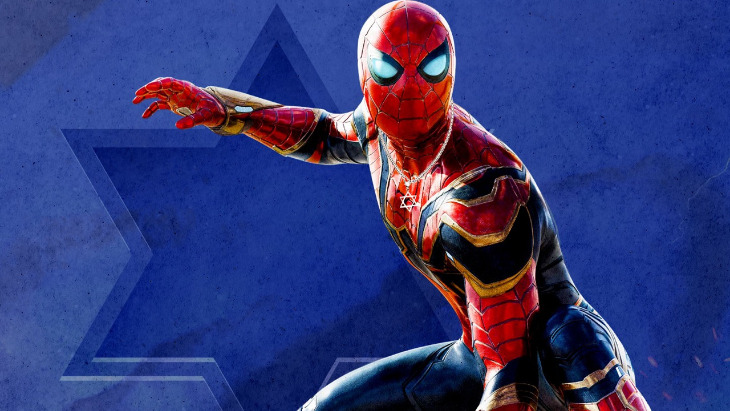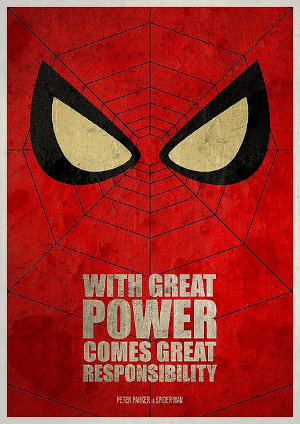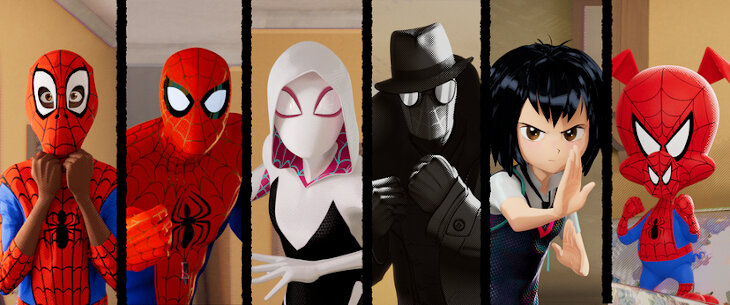 Iran’s Attack on Israel
Iran’s Attack on Israel


7 min read
With the new hit film Spider-Man: No Way Home shattering the barriers of the multiverse, it’s theoretically possible for a Jewish Spider-Man to join in the fight.
Even though the chances of that happening are pretty low, many of the conflicts, motifs, and themes in the Spider-Man universe are Jewish. Here are a few essential Jewish lessons from some of the Spider-Man movies.
The first cinematic appearance of the wall-crawler was released Sam Raimi’s 2002 film. Starring Tobey Maguire, it told the essential Spider-Man story. Peter Parker gets bit by a genetically altered spider, gains superpowers, tries to use said super powers to win money in a wrestling competition. Then the fight coordinator stiffs him on his payout. When the fight coordinator gets robbed at gunpoint, Peter could have stopped the assailant but doesn’t.
Little does he know that his Uncle Ben later does try to stop the robber only to get shot and killed. Peter painfully learns the lesson “with great power comes great responsibility” and finally assumes the superhero mantle of the Spider-Man.

With great power comes great responsibility (from here on out referred to as WGPCGR) is inherently Jewish. Let’s say you walk by a lake and see someone drowning. In American law, unless you have specialized training (i.e. you’re a lifeguard), you are under no obligation to save that drowning person. In fact in some States, if you do try to help and you unintentionally cause harm, you could be sued. Judaism, on the other hand, commands that if you have the ability to swim, you must dive into that lake and save them.
Owning the responsibility to change our world is our super power.
WGPCGR encapsulates the essence of Judaism. God made us His partners in creation; we are responsible for the entire world. If you can make a difference, you must make that difference, on a personal, local and global scale. We are responsible for every impact we could potentially make. It’s a sobering notion to have the weight of that responsibility on our shoulders. But owning the responsibility to change our world is our super power.
Marvel knocked it out of the park when they borrowed production rights from Sony and cast Tom Holland as Spider-Man. When Tony Stark (Iron Man) recruits Peter Parker in high school, he not only gives his suit an upgrade, he becomes a mentoring figure. Overly eager to do good, Peter craved the opportunity to impress his mentor. But as awe-inspiring as Tony Stark was, he wasn’t very attentive. Peter probably would have been better off finding a different mentor.

Judaism teaches that finding the right mentor is essential. Ethics of the Fathers says, “Make for yourself a teacher.” Don’t just appoint, discover, or find, but literally make yourself a teacher. This means that a mentor needs to be someone “fixed.” Don’t just take advice from wherever you can find it. It should come from someone you are going to have a lasting relationship with. Someone who is invested in you. Because when you have that great power, you really need to know what to do with it. And the person who is going to teach you how to use it shouldn’t be off at pool parties, getting drunk, or obsessed with his own daddy issues.
Tony Stark’s absenteeism leads to Peter taking dangerous chances that end up causing a lot of trouble and damage. Was it Peter’s fault? To some degree. But who gave him the hi-tech superpowered Spidey suit and let his cell phone go to voicemail?
Committing to the right mentor is essential for channeling your inner powers.
Spider-Man: Into the Spider-Verse is my favorite Spider-Man film. The animation is incredible, the humor is off the charts, and don’t get me started on the sound track. But most of all, it has so much heart, it’s palpable. Into the Spider-Verse stars Miles Morales, a mixed-race middle school student who is starting his first day at a New York charter school against his will. Though he is a brilliant student, he’d rather be listening to Post Malone while working on his art. He doesn’t identify with his police officer father or the other kids at Visions academy, but instead feels more at home with his laid back, and somewhat dangerous uncle. In short, Miles is having a bit of an identity crisis.
This theme is reemphasized and compounded throughout the movie. First, Miles gets bit by the spider and has to deal with new wonky powers he has no idea how to use or control. And when the actual Spider-Man (this movie’s Peter Parker) dies in his arms, he now has to deal with the reality of being the new Spider-Man on top of everything else. When he purchases an ill-fitting, dime store Spider-Man costume to attend the memorial service, it hits home that Miles is completely unprepared to take on the mantle.
 Into the Spider-verse
Into the Spider-verse
It’s not long before Miles meets five different variant copies of Spider-being through the multiverse (two of them are women, one of them is a pig). Each of these variants are reflections on what Miles could be if he meets his potential. But as enlightening as that can be, it also shows him where he falls short when he’s sidelined for not measuring up.
It’s common for Jews to wrestle with their Jewish identity. Is Judaism a religion or is it a race? Some of us are white, some of us are middle-eastern, some of us are black. We’ve got Jews from all sorts of denominations, and those who don’t identify with religion at all. Jews are so different from one another, as different as Miles Morales is from the Japanese robot pilot Peni Parker. And all too often this identity crisis separates us.
Wrestling with your Jewish identity and making it your own is the only way it comes alive and expresses who you really are.
So how does Miles finally master his abilities and own his identity? In a moment of solemn confession, Miles’ father gives him permission to pursue his brilliance any way he sees fit. From this freedom, Miles is able to finally control his Spider-powers. Throughout the movie he’s been wearing that ill-fitting dime-store costume. But now, he designs his own costume, something that expresses his uniqueness. He’s steps up to plate, ready help the Spider-Gang tangle with the Scorpion, Doc Ock, and the Kingpin.
Every Jew needs to come to terms with and own his identity. It’s not sufficient to keep your Jewish identity in default mode, just another item foisted upon you from birth, a label without much content or meaning. Wrestling with your Jewish identity and making it your own is the only way it comes alive and expresses who you really are.
Spider-Man is the most compelling when he’s striving to balance his heroism with his day-to-day life. When Peter has to abandon his date with Mary Jane because the Green Goblin terrorizes Times Square, only for him to come home to an empty refrigerator and a mountain of homework, it speaks to us because we’ve all been there – even if we’re not intercepting hurling cars.
That need for balance is what Judaism is really about. Power, mentors, and identity, those are all means to an end – the goal of happiness and fulfillment. It’s when we understand how to balance those things, we gain perspective on what deserves priority and what is really worth stressing over. Judaism helps us understand what is a world-ending catastrophe and what is just a harmless spider bite.
